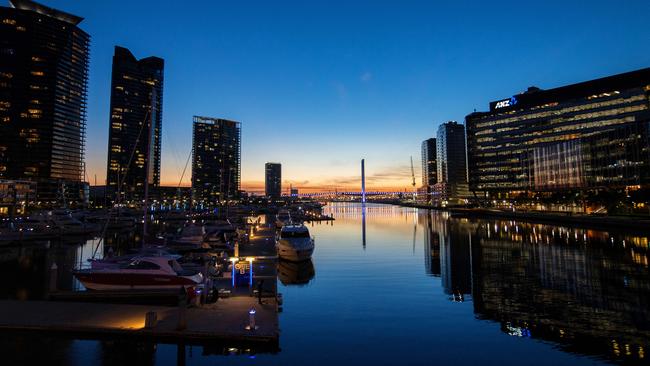Water park at Docklands would enhance Melbourne’s prized liveability, says top architect
MELBOURNE is set to defend its title as world’s most liveable city this month and one top architect says what our city needs to win is a water park at Docklands. Do you agree? VOTE IN OUR POLL.

News
Don't miss out on the headlines from News . Followed categories will be added to My News.
MELBOURNE’S liveability would be enhanced by the creation of a recreational water park at Docklands, says a top architect.
And the city needs an “urban design museum” where locals and visitors could help shape the future of the rapidly growing metropolis.
These ideas suggested by Kristen Whittle from architecture firm Bates Smart come as Melbourne defends its title as world’s most liveable city — an honour its held for six years in a row.
This month the Economist Intelligence Unit is due to reveal its latest rankings for 140 cities covering quality of life issues such as healthcare, culture and environment.
Mr Whittle, who has worked on key projects including the new Royal Children’s Hospital and London’s Tate Modern Museum, said huge growth was challenging the city’s prized livability.

“With more crowding that’s occurring within our CBD it might become less safe, there might be more crime, there might be more pressures on transport and infrastructure, and the effects of that would make it less liveable in an environmental sense,” he said.
RELATED: PUSH FOR BEACH AT DOCKLANDS
MORE: MELBOURNE SET TO LOSE MOST LIVEABLE CITY TITLE, SAY EXPERTS
READ: MELBOURNE WINS LIVABILITY TITLE AGAIN
Mr Whittle said the proliferation of skyscrapers in the inner city had provided an economic boost and confirmed that Melbourne was becoming a global city.
“The speed of that has probably taken us by surprise so I think there are perhaps some checks and balances that we could look at to improve the way in which they (new towers) are assessed,” he said.
A bugbear for the UK-born designer is the lack of a water playground in the inner city — and Harbour Esplanade at Docklands might be the answer.

“You could put outdoor swimming pools in the water, new piers, an urban beach and things like that so people actually gravitate to Docklands for an experience,” Mr Whittle said.
Another vision from the Bates Smart director is a central museum, perhaps located at Federation Square, where the city’s urban future could be contemplated.
“We should aim for a central point where everyone in the city gets an opportunity to see the future city, comment on it and take part in adding their thoughts to what the city needs,” he said.
“I’m keen that there’s a general civic consciousness within us all as a population that we’re building the city.”
Mr Whittle said that the world livability index was often misunderstood, and people were puzzled that Melbourne kept topping the list when the city was struggling with congestion.
“One would suspect it’s all to do with your day to day lifestyle, but it’s actually not,” he said.
“It’s more fundamentally related to have there been any terrorist attacks, or is health care available to the general public or is it all privatised, these sort of things.”


